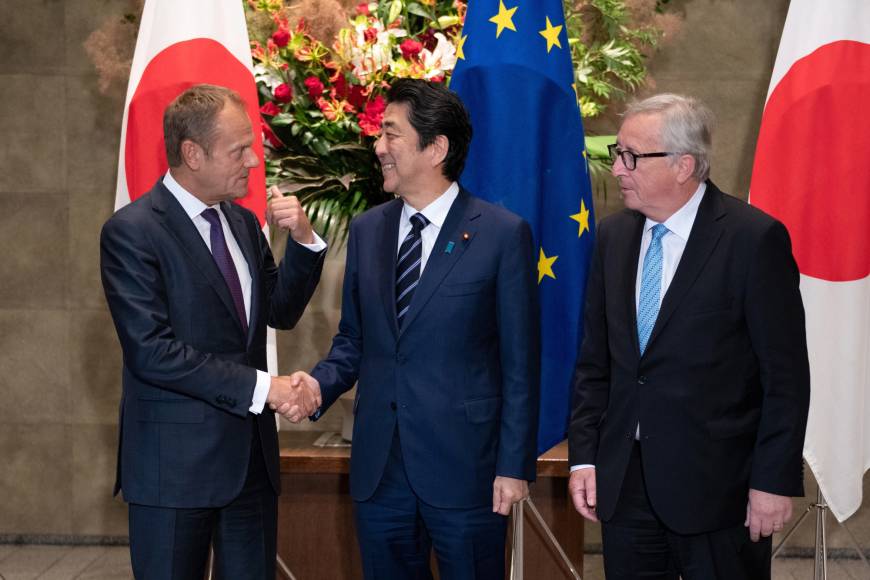Japan and the European Union complete trade deal accounting for 30 percent of world’s GDP BY Reiji Yoshida
 Prime Minister Shinzo Abe shakes hands with European Council President Donald Tusk as European Commission President Jean-Claude Juncker looks on before signing a free trade pact in Tokyo on Tuesday. | AP
Prime Minister Shinzo Abe shakes hands with European Council President Donald Tusk as European Commission President Jean-Claude Juncker looks on before signing a free trade pact in Tokyo on Tuesday. | AP
Top European Union leaders and Prime Minister Shinzo Abe signed an economic partnership agreement Tuesday in Tokyo, a pact that will create a massive free trade zone accounting for 37 percent of the world’s trade by value.
European Council President Donald Tusk and European Commission President Jean-Claude Juncker hastily arranged their visit to Tokyo after Abe was forced to abruptly cancel plans to attend a July 11 signing ceremony in Brussels in the aftermath of flooding and mudslides in western Japan.
Japanese officials said the signing is particularly important to counter intensifying protectionism worldwide triggered by U.S. President Donald Trump.
Negotiations on the pact between Japan and the EU, which started in 2013, had stagnated for a time but regained momentum after Trump took office in January 2017.
“We are sending a clear message that we stand together against protectionism,” Tusk said at a joint news conference with Abe after they signed the agreement.
“The relationship between the EU and Japan has never been stronger. Geographically we are far apart, but politically and economically we could be hardly any closer,” Tusk said. “I’m proud today we are taking our strategic partnership to a new level.”
Tusk stressed that the EU and Japan are partners sharing the same basic values, such as liberal democracy, human rights and rule-based order.
Abe also emphasized the importance of free and fair trade.
“Right now, concerns are rising over protectionism all around the world. We are sending out a message emphasizing the importance of a trade system based on free and fair rules,” he said.
The pact will create a free trade bloc accounting for roughly 30 percent of the world’s gross domestic product. Japan and the EU hope to have the agreement, which still needs to be ratified by both parties, come into force by March.
Under the EPA, tariffs on about 99 percent of Japan’s exported goods to the EU will eventually be eliminated, while duties on 94 percent of EU’s exported items to Japan will be abolished, according to the Foreign Ministry.
The EPA will eliminate duties of 10 percent on Japan’s auto exports to the EU seven years after the pact takes effect. The current 15 percent duties on wine imports from the EU will be eliminated immediately, while those on cheese, pork and beef will be sharply cut.
In total, the EPA will push up domestic GDP by 1 percent, or ¥5 trillion a year, and create 290,000 new jobs nationwide, according to the government.
“The world is now facing raging waves of protectionism. So the signing ceremony at this time is particularly meaningful,” a senior Foreign Ministry official said earlier this month on condition of anonymity.
“The impact for Japan is big,” the official said.
Fukunari Kimura, an economics professor at Keio University, said the EU is now trying to accelerate the ratification process.
“This is a repercussion of President Trump’s policies. They will try to ratify it before Brexit in March of next year,” he said in an interview with The Japan Times last week.
But the deal has raised concerns among some domestic farmers, in particular those from Hokkaido, the country’s major dairy producer.
According to an estimate by the Hokkaido Prefectural Government, the EPA will cut national production in the agriculture, fishery and forestry industries by up to ¥114.3 billion a year, with Hokkaido accounting for 34 percent of the predicted losses.
“The sustainable development of the prefecture’s agriculture, forestry and fisheries industries is our top priority. We need to make efforts to raise our international competitiveness,” Hokkaido Gov. Harumi Takahashi said during a news conference July 10.
Japan and the EU had reached a basic agreement on the EPA in December.
Tokyo also led negotiations on the Trans-Pacific Partnership free trade pact after Trump withdrew the U.S. from the deal in January 2017.
In March, 11 countries including Japan signed the so-called TPP11, or a revised TPP pact that does not include the U.S.
“The Japan-EU EPA is another important step for Japan to strengthen its trade relationship with key trading partners, and demonstrate that trade liberalization is alive and well, even if the United States is taking a different stance,” wrote Wendy Cutler, a former acting deputy U.S. Trade Representative, in an email sent to The Japan Times last week.
“The EU deal also reduces Japanese dependence on the U.S. market and thus increases its leverage to resist unreasonable trade demands by the United States,” she wrote.
According to the Foreign Ministry, the EU, which accounts for 22 percent of the world’s GDP, was the destination for 11.4 percent of Japanese exports in 2016. In the same year, the figure for the U.S. was 20.2 percent and 17.7 percent for China.
In 2016, Japan’s exports to the EU totaled ¥8 trillion, while reciprocal trade was ¥8.2 trillion.
Staff writer Cory Baird contributed to this report.
Gist of EPA between Japan and European Union
Japan will:
-
Eliminate tariffs on 94 percent of imported goods from the European Union, including 82 percent of farm and fishery products.
-
Set up a low-tariff quota on soft cheese from the EU and exclude rice from lower tariffs.
-
Immediately cut tariffs on chemical, industrial and textile products.
The European Union will:
-
Cut tariffs on 99 percent of imports from Japan.
-
Eliminate its 10 percent tariff on Japanese automobiles seven years after the deal’s implementation.
-
Immediately scrap tariffs on more than 90 percent of auto parts in terms of trade value.
LATEST BUSINESS STORIES
-
-
The dollar traded firmly above ¥113 in Tokyo trading late Wednesday, after recovering the threshold for the first time in some six months in early trading. At 5 p.m., the dollar sto…
-
-
Major Japanese automotive and industrial battery-maker GS Yuasa International Ltd. will boost car battery production in Thailand to serve demand stemming from growing vehicle sales in Southeast …

-
-
Stocks advanced further on the Tokyo Stock Exchange on Wednesday, lifted by the yen’s decline against the dollar. The Nikkei 225 average gained 96.83 points, or 0.43 percent, to end at 22,794.19…
Source:.japantimes.co.jp

